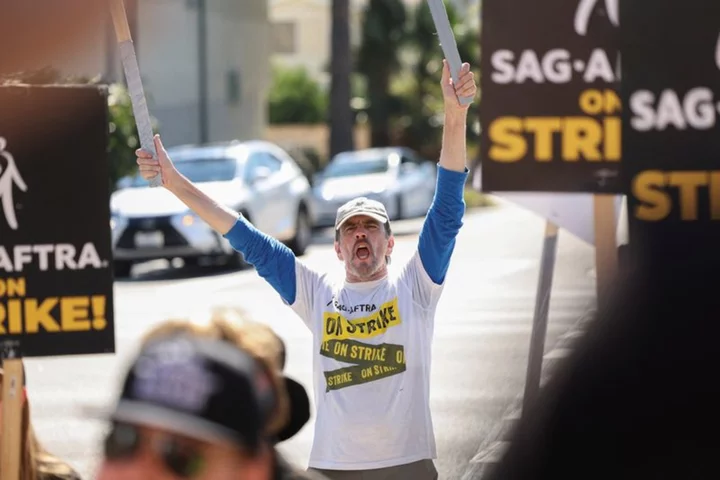By Lisa Richwine, Dawn Chmielewski and Danielle Broadway
LOS ANGELES Hollywood actors reached a tentative agreement with major studios on Wednesday to resolve the second of two strikes that rocked the entertainment industry this year as workers demanded higher pay in the streaming TV era.
The 118-day work stoppage will end officially just after midnight, the SAG-AFTRA union said in a statement after its negotiating committee voted unanimously to support the deal.
The group's national board will consider the agreement on Friday, and the union said it would release further details after that meeting.
Members of SAG-AFTRA walked off the job in mid-July asking for an increase in minimum salaries, a share of streaming service revenue and protection from being replaced by "digital replicas" generated by artificial intelligence (AI).
The union's negotiators reached the preliminary deal on a new contract with the Alliance of Motion Picture and Television Producers (AMPTP), which represents Walt Disney, Netflix and other media companies.
An AMPTP representative did not immediately respond to a request for comment.
The breakthrough means Hollywood can ramp up to full production for the first time since May, once union members vote to ratify the deal in the coming weeks.
"I'm relieved," actor Fanny Grande said in an interview. "It's been really difficult for most people in the industry, especially people of color. As it is, we don't have as many opportunities. We aren't big celebrities that have money in the bank for months. I just really hope that it's a fair deal."
Actor Jessica Payne said she felt "deeply grateful, cautiously optimistic and ready to work."
Word of a potential agreement had spread across Hollywood earlier on Wednesday, raising hopes among actors who had spent weeks picketing outside studio offices in New York and Los Angeles instead of on sets.
"Preliminary chatter was that a vote was imminent," said Rati Gupta, best known as Anu in the CBS comedy "The Big Bang Theory." "Hearts have been pounding for several hours today."
Actors had similar concerns to film and television writers, who argued that compensation for working-class cast members had dwindled as streaming took hold, making it hard to earn a living wage in cities such as Los Angeles and New York. TV series on streaming did not offer the same residual payments that actors enjoyed during the heyday of broadcast TV.
Performers also became alarmed by recent advances in artificial intelligence, which they feared could lead to studios manipulating their likenesses without permission or replacing human actors with digital images.
George Clooney and other A-list stars voiced solidarity with lower-level actors and had urged union leadership, including SAG-AFTRA President and "The Nanny" actor Fran Drescher, to reach a resolution.
Many film and TV sets shut down when the Writers Guild of America (WGA) called a strike in the spring. While WGA members returned to writing scripts in late September, the ongoing SAG-AFTRA work stoppage left many productions dark.
The disruptions cost California more than $6 billion in lost output, according to a Milken Institute estimate.
With little work available, many prop masters, costume designers and other crew members struggled to make ends meet. FilmLA, the group that approves filming permits, reported scripted production during the week of Oct. 29 had fallen 77% from the same time a year earlier.
The Hollywood strikes came during a year of other high-profile job actions. The United Auto Workers recently ended six weeks of walkouts at Detroit carmakers. Teachers, nurses and healthcare workers also walked off the job.
Hollywood's work stoppages forced broadcast networks to fill their fall lineups with re-runs, games shows and reality shows. It also led movie studios to delay big releases such as "Dune: Part 2" because striking actors could not promote them.
Other major films, including the latest installment of the "Mission: Impossible" franchise and Disney's live-action remake of animated classic "Snow White," were postponed until 2025.
(Reporting by Lisa Richwine; Editing by Stephen Coates)

